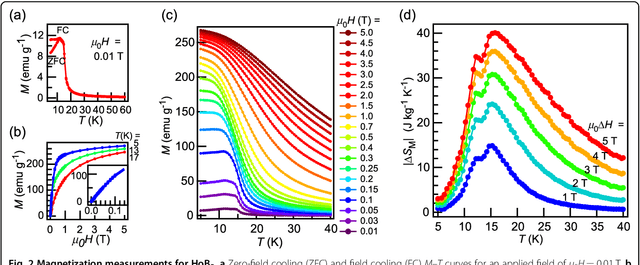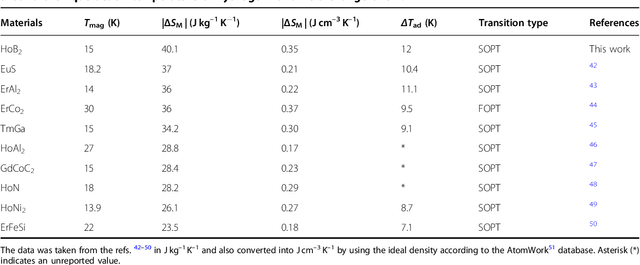Zhufeng Hou
Machine Learning Guided Discovery of Gigantic Magnetocaloric Effect in HoB$_{2}$ Near Hydrogen Liquefaction Temperature
May 12, 2020



Abstract:Magnetic refrigeration exploits the magnetocaloric effect which is the entropy change upon application and removal of magnetic fields in materials, providing an alternate path for refrigeration other than the conventional gas cycles. While intensive research has uncovered a vast number of magnetic materials which exhibits large magnetocaloric effect, these properties for a large number of compounds still remain unknown. To explore new functional materials in this unknown space, machine learning is used as a guide for selecting materials which could exhibit large magnetocaloric effect. By this approach, HoB$_{2}$ is singled out, synthesized and its magnetocaloric properties are evaluated, leading to the experimental discovery of gigantic magnetic entropy change 40.1 J kg$^{-1}$ K$^{-1}$ (0.35 J cm$^{-3}$ K$^{-1}$) for a field change of 5 T in the vicinity of a ferromagnetic second-order phase transition with a Curie temperature of 15 K. This is the highest value reported so far, to our knowledge, near the hydrogen liquefaction temperature thus it is a highly suitable material for hydrogen liquefaction and low temperature magnetic cooling applications.
* 12 pages including 3 figures and 1 table + 11 pages of supplementary information. Published version available at: https://rdcu.be/b36ep
Leveraging Legacy Data to Accelerate Materials Design via Preference Learning
Oct 25, 2019



Abstract:Machine learning applications in materials science are often hampered by shortage of experimental data. Integration with legacy data from past experiments is a viable way to solve the problem, but complex calibration is often necessary to use the data obtained under different conditions. In this paper, we present a novel calibration-free strategy to enhance the performance of Bayesian optimization with preference learning. The entire learning process is solely based on pairwise comparison of quantities (i.e., higher or lower) in the same dataset, and experimental design can be done without comparing quantities in different datasets. We demonstrate that Bayesian optimization is significantly enhanced via addition of legacy data for organic molecules and inorganic solid-state materials.
 Add to Chrome
Add to Chrome Add to Firefox
Add to Firefox Add to Edge
Add to Edge